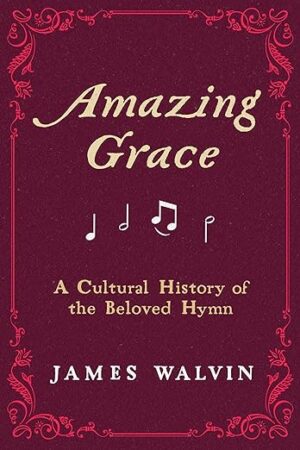Amazing Grace: A Cultural History of the Beloved Hymn
James Walvin (University of California Press, $30, 197 pages)
 The origin story of the hymn “Amazing Grace” is well-known: John Newton, the captain of a 18th century English slave ship, had a dramatic conversion after surviving a story which led him to become an abolitionist and pastor, with “Amazing Grace” written as a thanksgiving to God. It would become a song of hope for enslaved people around the world. It’s a nice story and it is nicely told by John Walvin in Amazing Grace: A Cultural History of the Beloved Hymn. Malvin provides a brief biographical sketch of Newton and the complexities and contradictions of his life that led to Newton publishing Olney Hymns, a collection of songs in 1779. There is a short exploration of the theme of grace as understood by Newton. But it is from there that the book really takes off, tracing the publishing history of the song and its persistent popularity among both white Protestants in the United States, and American slaves and their descendents, from America’s founding to today. The song’s power is in its message of both hope and gratitude. Walvin describes how the hymn spread from one branch of Protestantism to another, and how a growing diversity of instruments being played during church services influenced the popularity of the song. He also notes that along the way, the melody changed, and the one we are familiar with today was adopted in the 1830s, from a song called “New Britain.” The book concludes exploring the song’s international and commercial success in the latter half of the 20th century and how it became a (secular) symbol of unity. One aspect of “Amazing Grace” that is not explored other than with some fuzzy the-song-speaks-to-universal-values analysis, is why this most Protestant of songs made the jump to Catholic hymn books and is often featured at Catholic funerals today. Malvin is a historian, not a theologian, so those looking for a cultural history of a beloved hymn rather than a deep reading of the song will profit from his book.
The origin story of the hymn “Amazing Grace” is well-known: John Newton, the captain of a 18th century English slave ship, had a dramatic conversion after surviving a story which led him to become an abolitionist and pastor, with “Amazing Grace” written as a thanksgiving to God. It would become a song of hope for enslaved people around the world. It’s a nice story and it is nicely told by John Walvin in Amazing Grace: A Cultural History of the Beloved Hymn. Malvin provides a brief biographical sketch of Newton and the complexities and contradictions of his life that led to Newton publishing Olney Hymns, a collection of songs in 1779. There is a short exploration of the theme of grace as understood by Newton. But it is from there that the book really takes off, tracing the publishing history of the song and its persistent popularity among both white Protestants in the United States, and American slaves and their descendents, from America’s founding to today. The song’s power is in its message of both hope and gratitude. Walvin describes how the hymn spread from one branch of Protestantism to another, and how a growing diversity of instruments being played during church services influenced the popularity of the song. He also notes that along the way, the melody changed, and the one we are familiar with today was adopted in the 1830s, from a song called “New Britain.” The book concludes exploring the song’s international and commercial success in the latter half of the 20th century and how it became a (secular) symbol of unity. One aspect of “Amazing Grace” that is not explored other than with some fuzzy the-song-speaks-to-universal-values analysis, is why this most Protestant of songs made the jump to Catholic hymn books and is often featured at Catholic funerals today. Malvin is a historian, not a theologian, so those looking for a cultural history of a beloved hymn rather than a deep reading of the song will profit from his book.




